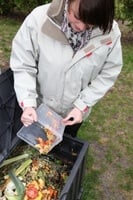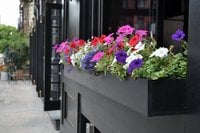
How to Create Your Own Compost
Spring is a great time to start your garden compost, and we’ve stumbled upon two great recipes to help you get started. All you’ll need are some basic household items and kitchen scraps and you’ll be on your way to a rich, natural fertilizer for all of your plants! Your compost should be a 3:1 ratio of carbon items to nitrogen items.
Nitrogen-rich items (also called “green” materials):
- Horse manure
- Dead houseplants
- Vegetable scraps (such as peelings)Eggshells
- Fresh grass clippings
- Hair
- Used coffee grounds
- Cottonseed meal
- Algae/seaweed
- Fish meal
- Fruit peels
Carbon-rich items (also called “brown” materials):
- Shredded newspaper
- Small branches/twigs
- Dried leaves
- Old hay
- Cardboard
- Dryer lint
- Corn stalks
- Pine needles
- Straw
- Untreated wood chips
- Garden weeds
Directions
When it comes to creating compost, you can make it right in a pile in your back yard, or (like our deer fencing company recommends) in a compost bin. Whichever you choose, make sure that no animals are able to get to it. For faster compost, chop up all of your ingredients into small pieces.
First, spread a six-inch layer of “brown” materials on the bottom of your compost bin. (If you’re not using a bin, make sure to lay a pile of twigs and sticks on the bottom to let your compost breathe.) Then, add 2-3 inches of “green” materials. After that, add just enough water so that your ingredients feel like a damp sponge. (You don’t want them dripping with water.) Then, add a thin layer of soil to help facilitate the decomposition and keep moisture in. Repeat this process until your layers are a few inches from the top of your bin.
If you’re simply making a compost pile, cover the finished pile with a tarp to keep the heat in.
Let your pile “bake” (it should reach 90-140 degrees Fahrenheit) for about five days. Then, stir up your ingredients to speed up the process. As the compost bakes, it will shrink in size – this is a good thing. After 1-2 months, your compost should be ready to use in your garden!
Items to not use in compost:
- Meat scraps
- Bones
- Dairy
- Oils
- Ashes
- Fish scraps
- Treated wood or grass
- Sawdust

